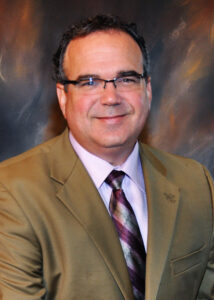
Andres Ruzo, Founder, Chairman, and CEO of Link America, shares how his company is engaging with public institutions and small to mid-sized businesses to address technology and cybersecurity issues emerging from the COVID-19 crisis.
This Q&A is part of an ongoing series of DRC interviews with representatives from our member organizations about how they are facing the COVID-19 pandemic.
Q: One of Link America’s core values is promoting synergy between the public and private sectors. How has Link America worked to deepen public-private collaboration amid the COVID-19 crisis?

A: Link America’s efforts to deepen public-private collaboration is not a new concept resulting from the COVID-19 crisis. Rather, our partnerships have been the continued result of our passion to be a socially responsible enterprise focused on helping all our communities equally.
As of late, we have been working with Dallas ISD (DISD), Dallas County, and technology partners to co-create, innovate, and collaborate in the promotion of a public-private partnership to address the “digital divide” facing our underprivileged communities. This would be achieved by developing an optimal partnership model that would address the communities’ struggle to gain broadband access.
Since 2015, Link America has supported a partnership with DISD to develop a private LTE network. However, the departure of the then-superintendent of DISD put this project on hold.
The COVID-19 pandemic and the subsequent shift to remote learning reinvigorated this effort, further convincing us of the benefit that a private network could bring to DISD. Link America continues to promote cooperation among public entities, nonprofit organizations, and private businesses. Developing an efficient partnership model to bring remote learning to students will result in great benefit to society.
Link America and our technology partners have the solutions, global expertise, and reputation to design, deploy, operate, and maintain the network.
Q: As companies have transitioned to remote work, cybersecurity has emerged as a critical concern, particularly for small and medium-sized businesses. How is Link America supporting businesses in enhancing their cybersecurity practices and technology?
A: Link America has a unique approach to proactively provide assessment and 24/7 real-time monitoring of cyber-risks and threats. The solution is a cloud-native service that complements the existing tools, offers ultra-scalability, and provides the small and medium-sized businesses with edge technology, such as machine learning and AI, in an affordable OPEX model. Link America’s proposal is a comprehensive user friendly platform that prioritizes security and can be tailored based on specific requirements.
Q: Some companies are maintaining work-from-home arrangements permanently, making cybersecurity an ongoing need. How is Link America helping prepare our local economy for the increased demand for cybersecurity experts moving forward?
A: Link America’s solution was designed specifically for businesses that need extra assistance to prevent, detect, and respond to cyberattacks; automated analysis and response only go so far. We have 24/7/365 resources to address cyberthreats. The combination of technology, threat intelligence, and skilled engineers are cost-effect ways to improve security.
Concurrently, Link America and DISD have been working together to develop a cybersecurity technology pathway through its P-TECH and Career Institutes programs. P-TECH is a dual-credit program that allows students to obtain an associate degree or college credit upon which they can continue education. Career institutes provide vocational preparation as a separate option.
Additionally, Link America has been working with the Dallas County Community College District (DCCCD) to help update the cybersecurity curriculum to meet the industry requirements and prepare students to enter the modern cybersecurity workforce.
The fast-moving industry trends make most educational programs antiquated and graduating students are not prepared to enter the workforce with the proper knowledge and skills. It is estimated that there will be 3.5 million unfilled cybersecurity jobs in the U.S. by 2021.
In response, Link America is working with public entities to collaborate and innovate in the development of a curriculum and a pathway from high school through college. Because the traditional model is having great difficulty in filling the needs of a dynamic cybersecurity workforce, we proposed a hybrid model to include base knowledge platform and a practice lab setting.